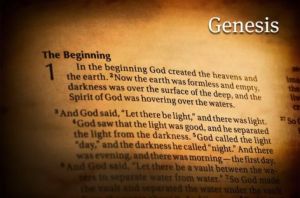Genesis is the book of beginnings, containing foundational theological ideas echoed throughout the OT. The Pentateuch holds the pride of place within the canon. Its respect, authority and holiness are evidenced by its position and separation from other books of the Septuagint. The diverse literary plan of the Pentateuch and the differing genres included enhance the artistic nature of the work and the key theological themes unifying the anthology. The OT affirms the fact that Moses was divinely inspired by Yahweh to record Hebrew law. Scholars differ on their establishment of the chronology of the recorded events in the Pentateuch, either relying on the interpretation of biblical numerology or comparative historical events to determine dates. In terms of interpretation of scripture, John Goldingay attempts to summarize contemporary views on the subject. His views align with the methodologies developed in the Middle Ages. The OT scriptures are inherently authoritative, whether in explicit teaching or implicit theological idea.
 Tradition holds that Moses is the author of Genesis, though it is difficult to present evidence for said conclusion. Genesis centers around eleven toledoth formulas . These are located throughout the book, and serve to organize information based on sources used by Moses. There are two main sections to Genesis, the background, or primeval history (Gen. 1-11), and the patriarchal narratives (Gen. 12-50). The purpose of Genesis is to tell how and why Yahweh came to choose Abraham’s family and make a covenant with them. The book of Genesis also carries significant geographical implications, establishing the ethnic and geopolitical identity of God’s chosen people. The first of the major divisions of Genesis, the creation and primeval history, serve to introduce who Yahweh is and what role he gave to man to fulfill. However, it is humanity who distorts the equilibrium and brought about the state of our present existence. This section documents the decline in human morality that occurred due to the fall. Through the account of Abraham in Genesis 12-25, the Lord shows that despite all obstacles, His covenants will be established and honored. The account of Joseph, Genesis 37-50, describes how the decedents of Abraham arrived in Egypt. The key themes in Genesis are the introduction of sin into the world, grace, and the idea of the covenant. Original sin was the beginning of many cycles of sin. Through God’s punishment for various sins throughout Genesis, His justice, as well as His mercy, is revealed.
Tradition holds that Moses is the author of Genesis, though it is difficult to present evidence for said conclusion. Genesis centers around eleven toledoth formulas . These are located throughout the book, and serve to organize information based on sources used by Moses. There are two main sections to Genesis, the background, or primeval history (Gen. 1-11), and the patriarchal narratives (Gen. 12-50). The purpose of Genesis is to tell how and why Yahweh came to choose Abraham’s family and make a covenant with them. The book of Genesis also carries significant geographical implications, establishing the ethnic and geopolitical identity of God’s chosen people. The first of the major divisions of Genesis, the creation and primeval history, serve to introduce who Yahweh is and what role he gave to man to fulfill. However, it is humanity who distorts the equilibrium and brought about the state of our present existence. This section documents the decline in human morality that occurred due to the fall. Through the account of Abraham in Genesis 12-25, the Lord shows that despite all obstacles, His covenants will be established and honored. The account of Joseph, Genesis 37-50, describes how the decedents of Abraham arrived in Egypt. The key themes in Genesis are the introduction of sin into the world, grace, and the idea of the covenant. Original sin was the beginning of many cycles of sin. Through God’s punishment for various sins throughout Genesis, His justice, as well as His mercy, is revealed.
The theological implications of Genesis 1-11 are fivefold. First, Moses reveals that Yahweh is king. When the Lord completes his creation, the name to which he is referred to changes from Elohim to Yahweh. This is the Lord’s covenant name and emphasizes the fact the Yahweh is King and rules over his creation. Second, Genesis reveals that Adam represents the King. Humans are charged with bearing the image of God by planting the Lord’s flag in the promise land. This was in direct conflict with the pagan practices at the time which devalued humanity. Third, Moses teaches that the king extends life. Life, as referred to in Genesis, means prosperity and a high quality of life. Moses’ audience would have understood that by remaining obedient to God’s commands in Genesis, they would be rewarded with ‘life’. Death, therefore, is the removal from the covenant blessings of the Lord. Fourth, the reader learns that the King responds to the rebellion of his people. There are many different examples of the responses of the Lord to the rebellion of His people, such as the flood narratives in Gen. 6 and the Tower of Babel in Gen. 11. Through these responses, the Lord’s judgment and mercy are revealed. Lastly, Moses sets the stage for the return of the king. In Gen. 3:15, there is a reference to “He” as the Lord punishes the snake. There are also later references in Gen. 49 that the “scepter shall not depart”, alluding to a kingly figure yet to come.
 The reader of Genesis must be sure to use the similarities with ANE material to gain an appropriate perspective on the Israelite literature preserved in the pages of scripture. The covenant theology established in Genesis is the foundation of Israelite theology. As Christians, we must take the words of Genesis and plant the flag of Yahweh in our everyday life. God changed us to bear His image. Thus, we represent God in the way that we interact with others because we essentially represent someone else. By bearing the image of God, Christians can experience true life, or a fulfilling quality of life. One path, according the Deuteronomy 28:63 leads to curses, but the other path leads to life and blessing. Jesus says in John 14:6 that “I am the way, the truth and the life,” thus, if Christians follow Jesus, they can experience ‘life’ as promised in the book of Genesis. Genesis sets the stage for the rest of the Bible. God established kingship, mandated humans with the image of God bearing, introduced futility in response to rebellion, and set the stage for the atonement for the people of God.
The reader of Genesis must be sure to use the similarities with ANE material to gain an appropriate perspective on the Israelite literature preserved in the pages of scripture. The covenant theology established in Genesis is the foundation of Israelite theology. As Christians, we must take the words of Genesis and plant the flag of Yahweh in our everyday life. God changed us to bear His image. Thus, we represent God in the way that we interact with others because we essentially represent someone else. By bearing the image of God, Christians can experience true life, or a fulfilling quality of life. One path, according the Deuteronomy 28:63 leads to curses, but the other path leads to life and blessing. Jesus says in John 14:6 that “I am the way, the truth and the life,” thus, if Christians follow Jesus, they can experience ‘life’ as promised in the book of Genesis. Genesis sets the stage for the rest of the Bible. God established kingship, mandated humans with the image of God bearing, introduced futility in response to rebellion, and set the stage for the atonement for the people of God.